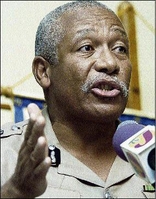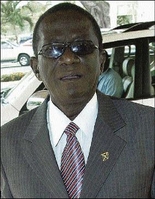The law must rule
Published: Sunday | June 14, 2009


Lewin (left) and Nelson
The following article was submitted by the civic action group, Jamaicans For Justice.
Three recent contrasting events have captured the state of Jamaica's justice system in a zoom lens and demonstrate the importance for Jamaicans to commit to live by the rule of law and not abandon our freedom, or the pursuit of our rights, in our quest for security.
National Security Minister Dwight Nelson's (what on earth could he have been thinking) recent statement to the Jamaica Police Federation was followed by a real-life incident in Montego Bay, that was reported on TVJ's Prime Time News the same evening. It was a tragic story of a mentally challenged man who was shot by a policeman, while he was, according to an eyewitness, begging for his life. The same bullet passed through the mentally challenged man, and killed a shopkeeper standing behind him, causing yet another "inadvertent casualty" and underscoring the domino effect of this type of action. Perhaps this stark incident contributed to the minister's subsequent apology to the nation.
Rear Admiral Hardly Lewin's recent decision to retire 10 cops allegedly involved in the lottery scam was welcome news after Minister Nelson's verbal damage of the previous week. Most disturbing, however, was the allegation that police personnel involved in the scam, tore out pages of the fire arms register, perhaps believing they could remove this evidence with impunity. The destruction of evidence, such as the washing away of blood and removal of spent bullets from crime scenes, and the intimidation of witnesses are part of a systemic pattern of corruption observed within the police force. Pages of the fire arms register were also "missing" in the Janice Allen case, recently reviewed by the director of public prosecutions.
mysterious disappearance
The arrest of four policemen in the "abduction and mysterious disappearance" of two men, Kemar Walters and Oliver Duncan, in 2004, raises to another level the concerns about reports of criminal activities within the force. The persistence with the investigation to bring members of the force to trial after five years is noteworthy, and Commissioner Lewin and his team deserve the highest praise for their efforts. This action provides a clear signal that the present commissioner and his team are intent on putting an end to impunity by prosecuting alleged wrongdoers and bringing some accountability to bear within the force.
Commissioner Lewin is a man who eschews public relations and wants his actions to speak for themselves. While we applaud his actions and determined effort to stem corruption in the Jamaica Constabulary Force, it is clear he will need both the Government's and society's support to accomplish successfully the massive overhaul that is necessary to reform it. The Government should waste no more time and expedite the increase in the power of the Office of the Commissioner to remove police personnel, in the interest of the public good. The Police High Command, the Ministry of Justice and the Ministry of National Security also need to remove any ambiguity and issue a clear, coherent and unanimous message, that police who use extra-judicial force, or who are involved in any form of criminal activity will be brought to book. The swift implementation of the Independent Commission of Investigation also needs to be realised to help investigate police abuse.
Prime Minister Bruce Golding's statement to the Island Special Constabulary Force's meeting was right on the mark. He called for introspection and said the police must separate the criminals from law-abiding citizens and cannot themselves be "instruments of brutality". This reflects a welcome level of candour, given the political and economic landscape, with the dire need for better compensation for the officers and the public's outrage at the high level of crime. But it is an essential message, and a timely one, for the nation is crying out for leadership.
Contrary to Minister Nelson's statement, we are not at war; however, it is a tragic fact that far too many Jamaicans are killed every year. Well over 1,000 citizens are murdered annually, with the police killing more than 200 persons and over 10 police officers also being killed. These are three horrific statistics by any international standard for a country not at war.
threat to jamaica
We fully understand the serious nature of the threat that Jamaica faces with the international trade in drugs and guns and heavily armed gangs, and the real dangers involved for police officers operating in this environment. We owe an enormous debt of gratitude to those in the force who attempt to do their job valiantly every day by adhering to their pledge to serve and protect. We know they love their country and understand the vital importance of their role to society. They deserve our full, unequivocal support, respect and cooperation in the lawful execution of their duty. The police, however, will never gain the trust or respect they need to effectively carry out their job, if some within the force persist in acting outside of the law.
The question of trading human rights for security is not a new one. In 1755 Benjamin Franklin wrote: "Those who would give up essential liberty to purchase a little temporary safety deserve neither liberty nor safety." Many nations grapple with this dilemma. The US is currently struggling to reconcile the ideals and values enshrined in its constitution with the widespread abuse of human rights and abhorrent use of torture during the post-9/11 period.
President Obama recently said Winston Churchill had eschewed torture because of its corrosive moral effect: "Churchill understood, you start taking short-cuts, over time, that corrodes what's best in a people. It corrodes the character of a country."
Because all rights are inter-connected, the removal of one human right usually leads to the infringement of other rights. We respectfully submit, therefore, that the most corrosive danger to our nation is the corruption of the rule of law and the corollary, which is the abuse of human rights.
Feedback may be sent to columns@gleanerjm.com
